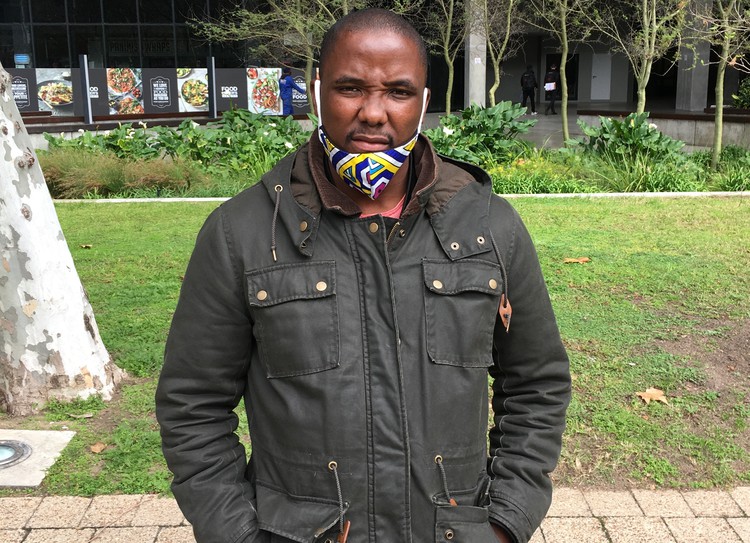Any damages suffered by man dragged naked from his shack is his own doing, says City of Cape Town
Bulelani Qolani is suing the City for R1.4-million
Bulelani Qolani is seeking R1.4-million from the City of Cape Town for being dragged naked from his shack during a demolition in 2020 which was widely publicised. Archive photo: James Stent
- Bulelani Qolani is seeking R1.4-million from the City of Cape Town for being dragged naked from his shack during a demolition in 2020.
- The City denies liability and says Qolani knew his shack was about to be demolished and “removed his clothes and chose to be naked”.
- The City wants Qolani’s claims dismissed with costs.
The City of Cape Town has denied liability for any damages suffered by Bulelani Qolani who was dragged naked from his shack during demolitions by the anti-land invasion squad in Khayelitsha during lockdown in July 2020.
Qolani, represented by Ndifuna Ukwazi, is suing the City for R1.4-million for hospital and medical expenses, psychotherapy, trauma counselling, other expenses he incurred during and after the incident, and loss of earnings.
In court papers he says he built his shack and immediately occupied it on 28 June 2020. He had a bed, basin, gas cooker and other belongings inside.
Two days later on 30 June, the City’s anti-land invasion unit (ALIU) demolished structures in the area but not his shack. However, on 1 July, the ALIU came to demolish Qolani’s corrugated iron and wood structure.
In the City’s version of events, Qolani knew that his structure was about to be demolished yet he removed his clothes and “chose to be naked” in front of City officials and members of the public who were gathering outside his home. The City claims he “chose to remain naked”.
“He entered and sought to remain in the structure at a time when he knew it was about to be demolished and sought to re-enter it when it was in the process of being demolished,” the City says in its defence.
The City argues that Qolani failed to adhere to “lawful instructions” by officials and “to have regard for his own safety and that of the officials in regard to the foregoing”.
The City says it was during his effort to re-enter the structure that Qolani was physically engaged by ALIU officers.
Qolani, in court papers, says that the ALIU officers kicked him while he was inside his home and pepper-sprayed his eyes. He says he was repeatedly wrestled to the ground and that the officers assaulted him by “throwing him to the ground and putting a knee on his back to prevent him from standing up”.
Qolani says City officials “unlawfully” evicted him and “wrongfully and intentionally” entered his home without his consent and without prior warning, disturbed the privacy of his bathing to execute the demolition, and physically forced him from his home when he requested to finish bathing. The City denies this.
The City says the ALIU “forcibly removed [Qolani] from a structure and tried, unsuccessfully, to prevent him from re-entering” it. The City also says the amount of force used was “reasonable and necessary given the impending collapse of the structure”.
Qolani claims that in addition to physical harm, he suffered humiliation, ridicule, contempt, the impairment to his dignity, personality and bodily integrity.
The City argues that by “choosing” to be naked in front of its officials and the public gathered outside his structure, Qolani was “fully aware of suffering humiliation, ridicule and contempt, the impairment to his dignity, personality and bodily integrity”.
The City says that “if it should be found that the plaintiff did suffer loss (which is denied), it is denied that this is attributable to the defendant as opposed to the plaintiff himself, who was negligent”.
The City wants Qolani’s claims to be dismissed with costs or “alternatively, that the amounts of damages to be awarded to the plaintiff … be reduced … to such extent as may seem just and equitable, having regard to the plaintiff’s degree of fault.”
A hearing date for the matter has not yet been set.
Support independent journalism
Donate using Payfast

Don't miss out on the latest news
We respect your privacy, and promise we won't spam you.
Next: R3.05 per child: Eastern Cape school battles to feed learners
Previous: Philippi community and City seek ways to end no-go zone status
© 2023 GroundUp. This article is licensed under a Creative Commons Attribution-NoDerivatives 4.0 International License.
You may republish this article, so long as you credit the authors and GroundUp, and do not change the text. Please include a link back to the original article.
We put an invisible pixel in the article so that we can count traffic to republishers. All analytics tools are solely on our servers. We do not give our logs to any third party. Logs are deleted after two weeks. We do not use any IP address identifying information except to count regional traffic. We are solely interested in counting hits, not tracking users. If you republish, please do not delete the invisible pixel.

